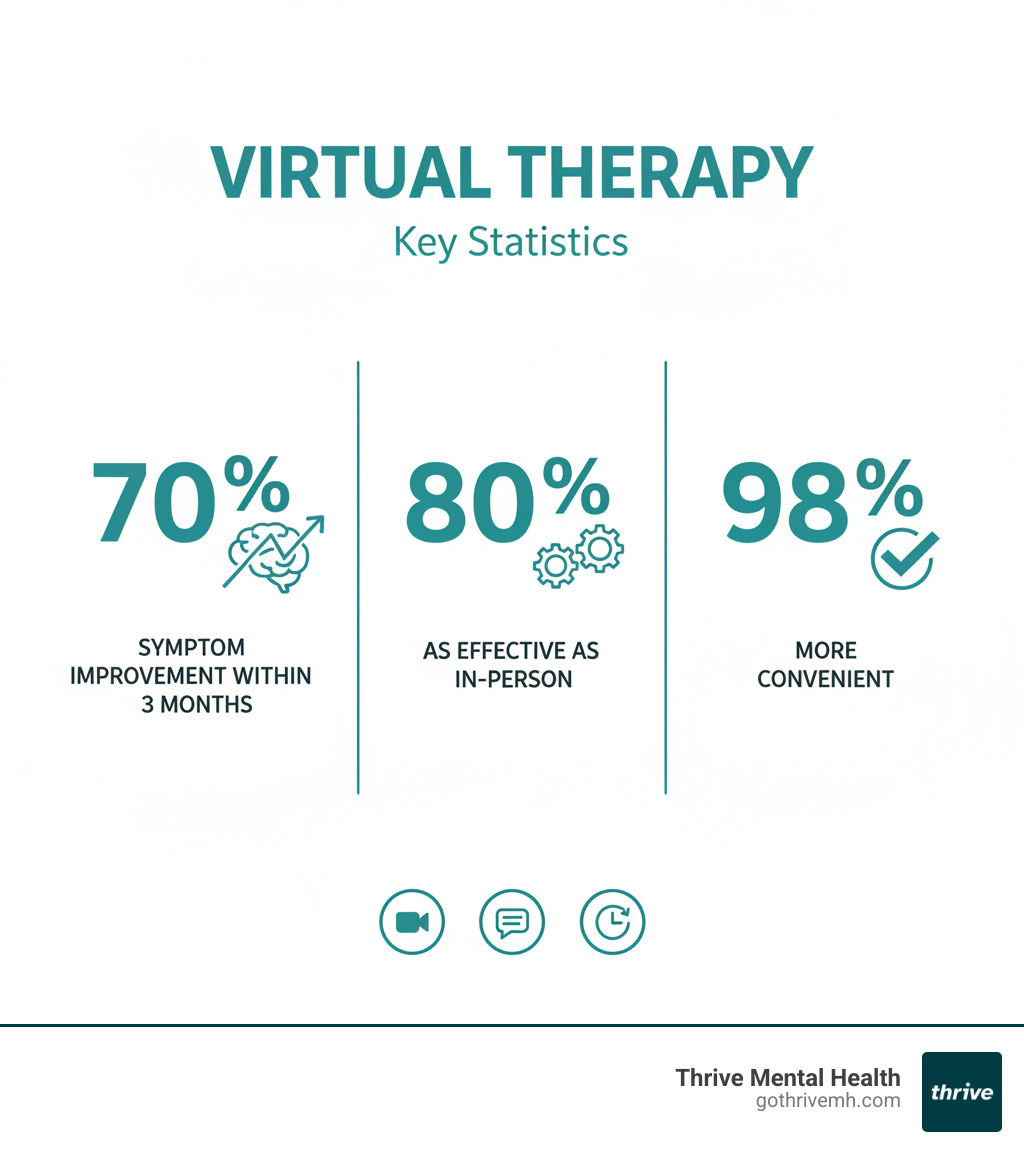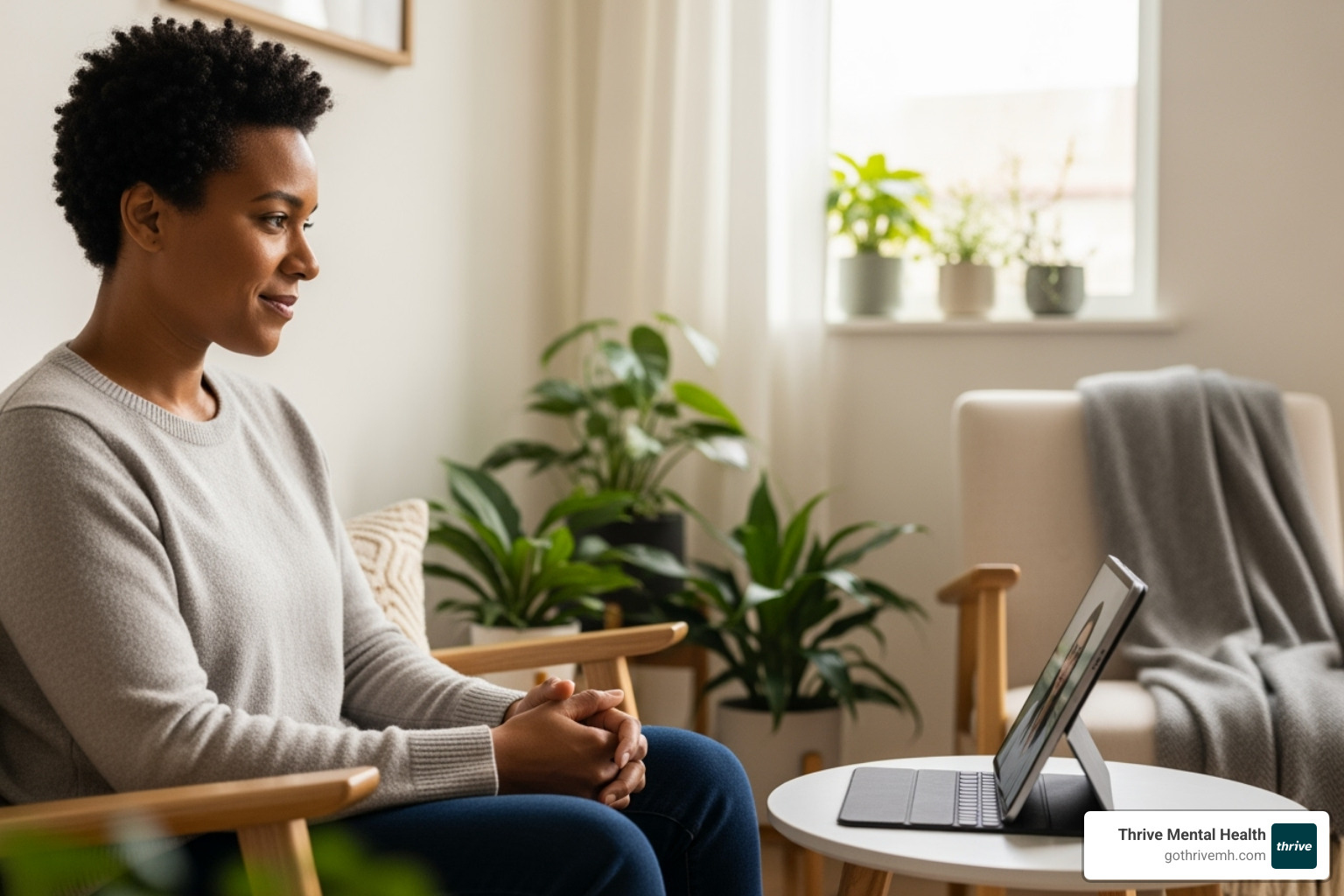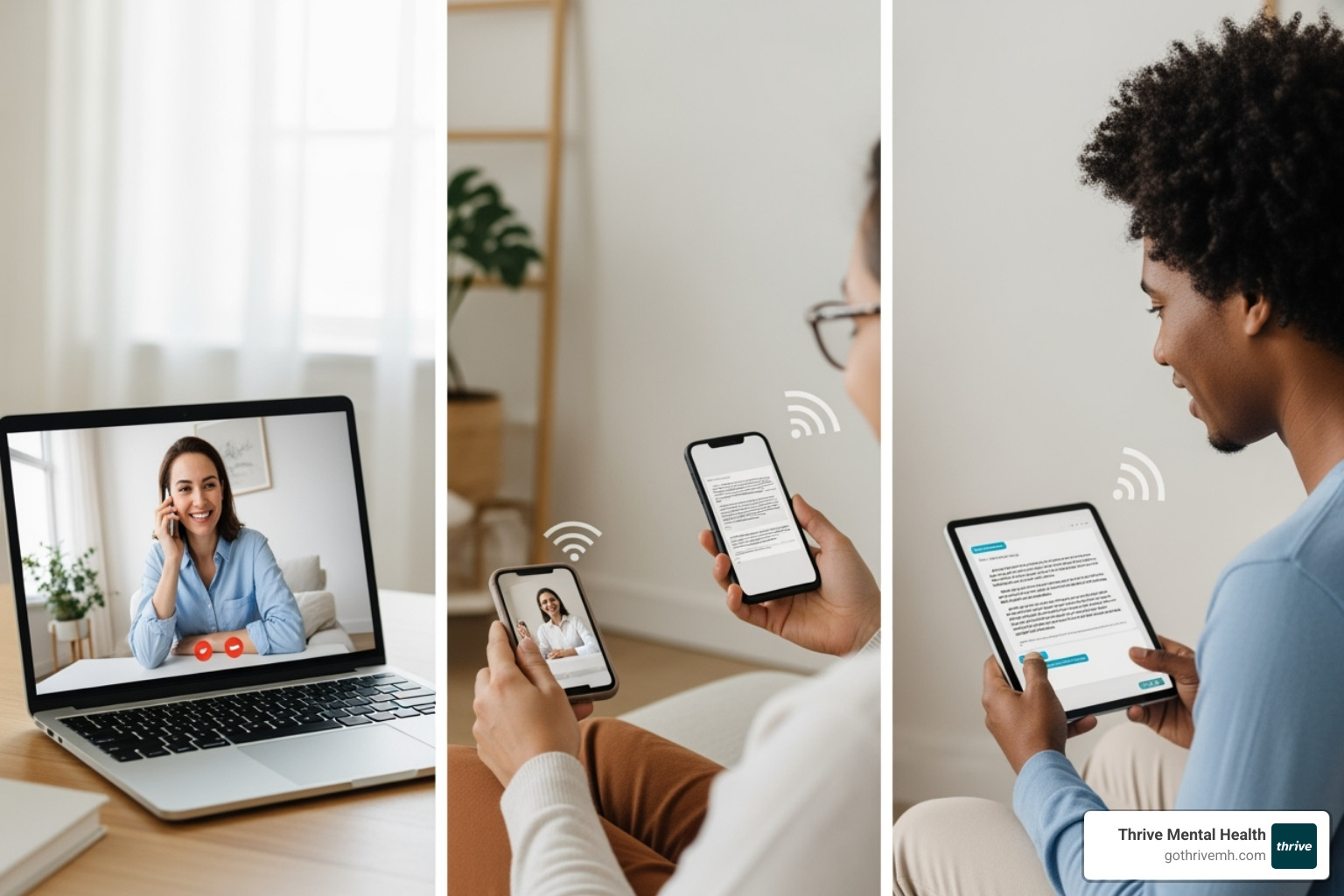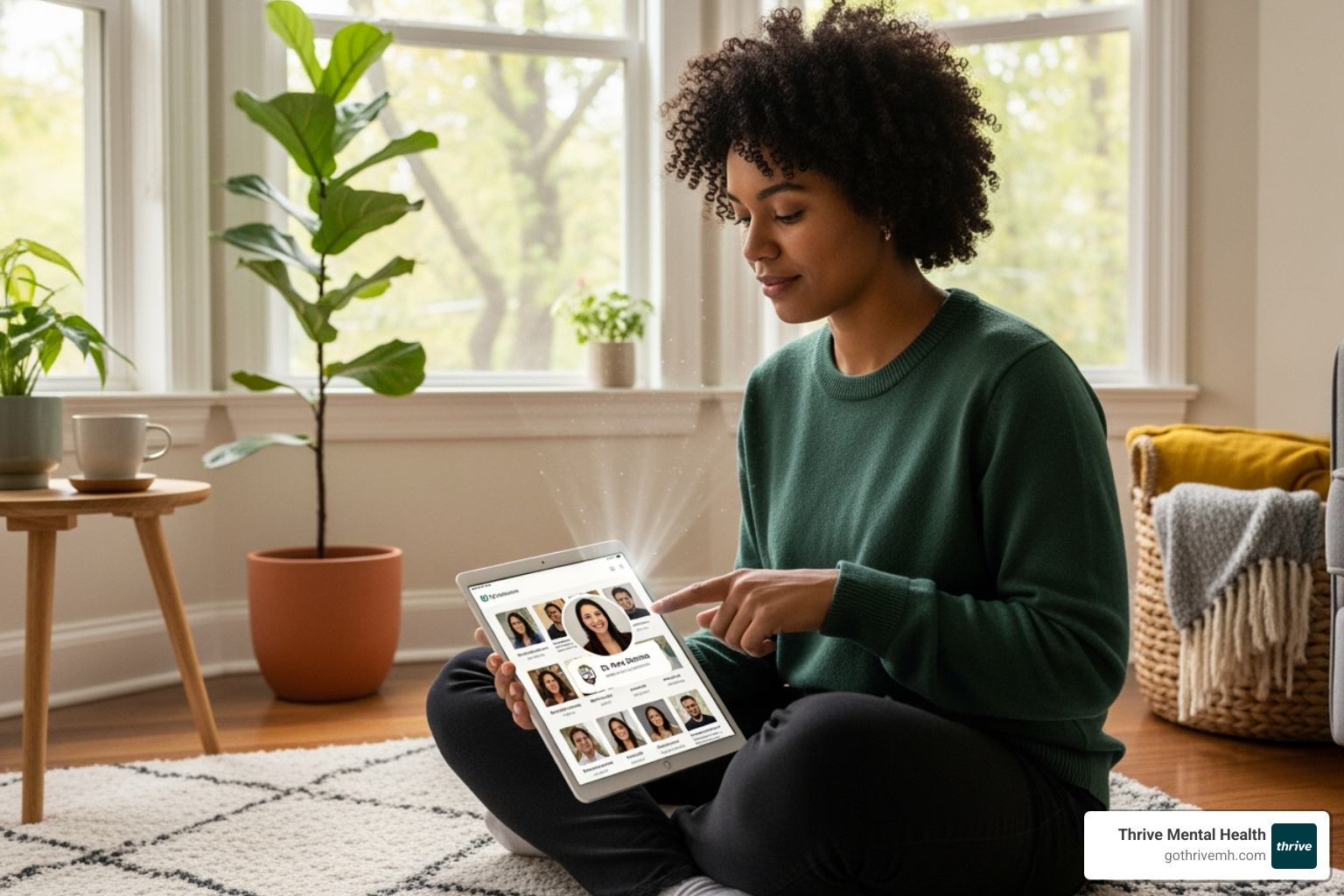Top Virtual Therapy Platforms to Fight Depression

If you or someone you know is in crisis or having thoughts of suicide, please call or text 988 to reach the Suicide and Crisis Lifeline. Support is available 24/7. You are not alone.
Virtual Therapy for Depression [2025]: Start in 48 Hours—Skip Waitlists, Use Insurance
If you’re in crisis, call/text 988 right now. You are not alone.
Virtual therapy for depression offers immediate access to licensed therapists from anywhere—no waiting rooms, no commute, no scheduling around office hours. Here’s what you need to know:
Top Benefits:
- Access licensed therapists in minutes, not months
- Schedule sessions around your work and life
- Choose video, phone, or secure messaging
- Often covered by insurance (Cigna, Optum, Florida Blue)
- Research shows it’s as effective as in-person therapy
Best for: Mild to moderate depression, busy professionals, anyone wanting flexible, private care from home.
Depression affects millions, but traditional therapy creates barriers—long wait times, rigid schedules, geographic limitations. Research shows that 70% of people see improvement in anxiety or depression symptoms within 3 months of starting virtual therapy, with 98% finding it more convenient than face-to-face sessions. For many, this accessibility provides a chance to not give up on themselves and to see their challenges in a new light.
The convenience factor is real. You can access care during lunch breaks, after work, or whenever symptoms strike. No more taking time off or finding childcare just to get help.
I’m Anna Green, LMHC, LPC, Chief Clinical Officer at Thrive Mental Health, where I’ve helped design virtual-first behavioral health programs that earned The Joint Commission’s telehealth accreditation. Through my work developing evidence-based virtual therapy for depression programs, I’ve seen how removing barriers to care transforms lives.

Virtual therapy for depression terms to remember:
Why Virtual Therapy for Depression Is Changing Lives in 2025
The mental health landscape has transformed dramatically, and virtual therapy for depression is leading this revolution. What started as an emergency solution during the pandemic has evolved into something far more powerful—a mainstream, research-backed approach that’s removing barriers and changing how we think about getting help.
Gone are the days when seeking therapy meant juggling work schedules, sitting in traffic, or hoping the one therapist in your small town has an opening next month. Today’s virtual therapy for depression brings professional care directly to wherever you feel most comfortable—your living room, office, or even your car during a lunch break.

The numbers tell a compelling story. Research shows that 98% of users find online therapy more convenient than traditional face-to-face sessions, while maintaining the same level of effectiveness for treating depression. This isn’t just about convenience—it’s about making life-changing care accessible to people who might otherwise go without help.
No More Barriers: Get Care from Anywhere
The most aspect of virtual therapy for depression isn’t the technology—it’s how it eliminates the obstacles that have kept people from getting help for far too long.
No more commute stress. Imagine starting your therapy session feeling calm instead of frazzled from fighting traffic or searching for parking. Your session begins and ends in your chosen space, saving you precious time and mental energy that can now go toward your healing.
Flexible scheduling that works with real life. Virtual platforms often offer evening and weekend appointments that traditional offices can’t match. That 7 PM session after the kids are in bed? Totally doable. The lunch break appointment that doesn’t require explaining to your boss where you’re going? It’s yours.
Rural areas finally get equal access. If you live in a small town in the Florida Panhandle or a rural part of Central Florida where mental health specialists are scarce, virtual therapy opens up a world of qualified providers. Distance is no longer destiny when it comes to getting quality care.
Physical limitations disappear. Chronic illness, mobility issues, or even a broken-down car no longer stand between you and your mental health. Virtual therapy meets you exactly where you are, literally and figuratively.
Privacy feels more natural. For many people, the comfort of their own space reduces anxiety about seeking help. There’s something powerful about being able to grab your favorite blanket or sit with your pet during a session—small comforts that can make therapy feel less intimidating and more healing.
Weather and life happen—therapy continues. Snowstorm? Minor cold? Unexpected work crisis? These everyday disruptions no longer derail your treatment progress. Consistency in therapy is crucial for managing depression, and virtual care makes that consistency achievable.
This accessibility isn’t just convenient—it’s transformative. When barriers disappear, people are more likely to start therapy sooner and stick with it longer. You can explore more about this modern approach in our guide to Virtual Therapy: A Convenient and Effective Approach to Counseling.
More Choices, More Support: Find the Right Therapist for You
Traditional therapy often limits you to whoever happens to practice within driving distance. Virtual therapy for depression flips this equation entirely—now you can prioritize finding the right fit over finding someone nearby.
Access to true specialists becomes possible when geography isn’t a factor. Looking for someone who specializes in postpartum depression, seasonal affective disorder, or trauma-informed care for depression? Virtual platforms connect you with experts regardless of where they’re located.
Cultural understanding matters deeply in therapy, and virtual care makes it easier to find therapists who share your background or have specific experience with your community. Whether you’re seeking LGBTQIA+ affirming care, bilingual services, or someone who understands your cultural context, the options expand dramatically.
Breaking location barriers means you’re no longer stuck with limited local options. If you connect with a therapist’s approach but they practice in another state where they’re licensed, virtual therapy makes that relationship possible.
The pool of providers grows exponentially when you’re not limited by commute times. This increased choice means you’re more likely to find someone whose personality, approach, and availability truly align with your needs—and that therapeutic fit is one of the strongest predictors of successful treatment.
This expansion of choice isn’t just about having options—it’s about finding the right person to walk alongside you in your healing journey. When you find that right fit, everything else becomes possible.
Does Online Therapy Work for Depression? Here’s What the Research Shows
The effectiveness question is what matters most when you’re considering any healthcare option, and virtual therapy for depression has been put through rigorous scientific testing. The results? They’re pretty impressive.
Here’s what the research actually shows: online therapy can be just as effective as sitting in a therapist’s office, especially for depression and anxiety. That’s not just marketing talk—it’s backed by solid data.
Multiple studies paint a clear picture of success. Research published in BMC Psychiatry found that 80% of people reported their online therapy was as or more effective than face-to-face sessions. Another comprehensive study following over 300 patients with depression found that participants experienced “significantly reduced depression” after just three months of virtual therapy using video, text, and chat options. Studies show online therapy can be highly effective, with researchers from institutions like UCLA Health reaching similar conclusions that virtual sessions work just as well as in-person meetings for most people dealing with depression, anxiety, and trauma.
But what about that personal connection? Many people worry they won’t be able to build a meaningful relationship with their therapist through a screen. The research—and countless patient experiences—shows this concern is largely unfounded. In fact, many people find that being in their own comfortable space actually helps them open up more honestly with their therapist.
Virtual therapy for depression works best for mild to moderate depression. If you’re dealing with more complex conditions or severe symptoms that might require intensive crisis intervention, you might need a higher level of care like Thrive’s virtual intensive outpatient programs. But for the vast majority of people experiencing depressive symptoms, the evidence is solid—online therapy delivers real, lasting results.
The high satisfaction rates and meaningful improvements people experience through online therapy are helping close the massive gap in mental health treatment. It’s exciting to see how technology is making effective care accessible to so many more people. You can explore more about this digital change in mental health in our article on The Rise of Virtual Behavioral Health: Changing Mental Healthcare.
Crisis Support Notice: Virtual therapy is not for emergencies. If you are in immediate distress or considering self-harm, call or text 988 right now. A trained crisis counselor can provide immediate support. You are not alone.
Thrive’s Virtual Therapy for Depression: What to Expect & How It Works
At Thrive Mental Health, we’ve designed our virtual therapy for depression programs with one goal in mind: making professional mental health care as accessible and effective as possible. Whether you’re dealing with work stress, relationship challenges, or persistent feelings of sadness, our virtual approach removes the traditional barriers while maintaining the same high standards of clinical excellence you’d expect from in-person care.

Choose Your Session Style: Video, Phone, or Messaging
Here’s the thing about therapy—it’s not one-size-fits-all, and neither should be how you connect with your therapist. At Thrive, we offer multiple ways to engage because we know that comfort leads to better outcomes.
Video sessions are our most popular option, and for good reason. There’s something powerful about seeing your therapist’s facial expressions and body language that helps build trust and connection. Many of our clients say video sessions feel almost like sitting across from their therapist in a traditional office—except they’re in their favorite chair at home, maybe with their therapy dog at their feet.
Phone sessions work beautifully for people who prefer focusing purely on the conversation without visual distractions. Some of our busiest professionals love phone sessions because they can take them during lunch breaks or while walking. There’s also something freeing about not worrying how you look when you’re having a tough day.
Secure messaging adds another layer of support between your live sessions. Think of it as having a way to check in with your therapist when thoughts or feelings come up throughout the week. It’s not meant to replace your regular sessions, but it can provide valuable continuity in your care.
Building a genuine therapeutic relationship through a screen might sound challenging, but our therapists are specifically trained in virtual care techniques. They know how to create that safe, supportive space you need, regardless of which communication method feels right for you. This comprehensive approach is part of our broader Treatment for Major Depression and Anxiety programs.
Proven Methods Thrive Uses in Virtual Therapy for Depression
When it comes to treating depression, we don’t guess—we use methods backed by decades of research and thousands of success stories. Our virtual therapy for depression programs are built around evidence-based approaches that consistently help people feel better and stay better.
Cognitive Behavioral Therapy (CBT) forms the foundation of much of our work. If you’ve ever caught yourself in a spiral of negative thinking—”I’m a failure,” “Nothing will ever get better,” “I can’t do anything right”—CBT gives you the tools to recognize these patterns and challenge them. It’s not about positive thinking or pretending problems don’t exist. Instead, it’s about developing a more balanced, realistic way of viewing yourself and your situation. Our guide on How CBT Can Transform Negative Thought Patterns explains this process in detail.
Behavioral Activation might sound fancy, but it’s actually quite practical. When we’re depressed, we tend to withdraw from activities that used to bring us joy or meaning. This creates a vicious cycle—the less we do, the worse we feel, and the worse we feel, the less we want to do. Behavioral Activation helps break this cycle by gradually reintroducing meaningful activities into your life, starting small and building momentum.
EMDR (Eye Movement Desensitization and Reprocessing) comes into play when past experiences are contributing to current depression. While originally developed for trauma, EMDR has shown remarkable effectiveness for depression, especially when difficult memories or experiences are part of the picture. The beauty of virtual EMDR is that you can process these experiences in the safety of your own space, which often feels less vulnerable than an unfamiliar office.
What’s Next: AI, VR, and Self-Guided Tools at Thrive
Mental health care is evolving rapidly, and we’re excited to be at the forefront of innovations that can improve your healing journey. While human connection remains at the heart of effective therapy, technology offers some fascinating new ways to support your progress.
AI chat support is becoming a valuable complement to traditional therapy. Think of it as having a knowledgeable, patient companion available 24/7 who can help you practice coping skills, identify triggers, or simply provide a listening ear when your therapist isn’t available. These AI tools aren’t meant to replace human therapists, but they can offer immediate support during difficult moments.
Virtual Reality for relaxation is showing incredible promise for mental wellness. Imagine being able to “visit” a peaceful forest, meditate on a serene beach, or practice mindfulness in a beautiful mountain setting—all from your living room. VR can create immersive experiences that help reduce stress, practice relaxation techniques, and even work through specific fears or anxieties in a controlled environment.
Self-guided programs empower you to continue your growth between sessions. These might include interactive exercises, mood tracking tools, guided meditations, or skill-building modules you can complete at your own pace. They’re designed to reinforce what you’re learning in therapy and help you build confidence in managing your mental health independently.
These innovations aren’t science fiction—they’re happening now, and we’re constantly evaluating how to integrate the most effective tools into our care. To learn more about where mental health technology is heading, check out our article on Exploring the Future of Mental Wellness: Virtual Therapy Innovations.
How to Choose the Best Virtual Depression Therapy at Thrive
Finding the right virtual therapy for depression provider can feel overwhelming, but it doesn’t have to be. At Thrive Mental Health, we’ve streamlined the process to help you connect with the perfect therapist who truly understands your needs and can guide you toward healing.
Think of choosing a virtual therapist like finding a trusted friend who happens to have professional training in helping people feel better. You want someone who gets you, speaks your language, and makes you feel comfortable opening up about your struggles.

How to Vet Your Thrive Virtual Therapist
When you’re trusting someone with your mental health, you deserve complete confidence in their expertise. At Thrive, we take the guesswork out of finding qualified professionals.
Every therapist in our network holds proper licensing and credentials as mental health professionals. We don’t cut corners here—all our providers have the necessary degrees, certifications, and ongoing training in their fields. More importantly, we strictly follow state-specific regulations, ensuring your therapist is fully licensed to practice in Florida, whether you’re calling from Miami, Jacksonville, or anywhere else in the state.
What sets our therapists apart is their specialized experience with depression. We’re not talking about general counselors who dabble in everything. Our providers have dedicated training and real-world experience helping people steer depression, anxiety, and related challenges. Many specialize in evidence-based approaches like CBT, EMDR, and behavioral activation—the same techniques that research shows work best for depression.
Don’t be shy about asking questions during your first session. We encourage you to ask about their therapeutic approach, their specific experience with your type of depression, and how they maintain confidentiality in virtual settings. A good therapist welcomes these questions because they want you to feel confident in your choice.
Cost, Insurance, and Local Coverage for Virtual Therapy
Let’s be honest—cost is often the elephant in the room when it comes to mental healthcare. We believe virtual therapy for depression should be accessible, not a luxury that only some can afford.
We offer flexible payment options because we understand that everyone’s financial situation is different. Whether you prefer subscription-style plans or per-session payments, we work with you to find an approach that fits your budget and treatment needs.
The good news about insurance coverage? Most major plans now recognize virtual therapy as essential healthcare. We’re in-network with major providers like Cigna, Optum, and Florida Blue throughout Florida. This means lower out-of-pocket costs for you and less hassle with paperwork.
Not sure about your coverage? We’ve made it ridiculously easy to find out. You can verify your insurance in 2 minutes right on our website—no obligation, no sales pressure, just clear answers about what your plan covers.
If we happen to be out-of-network with your specific plan, we can provide superbills that you can submit to your insurance company for potential reimbursement. Many people are surprised to find they can get money back even when using out-of-network providers.
The bottom line? We don’t want cost to be the reason you don’t get help. Our team will work with you to explore every option and find a path forward that makes sense financially. For more details about how insurance works with online mental health services, check out our Mental Health Care Online page.
Frequently Asked Questions about Virtual Therapy for Depression
How fast can I start virtual therapy for depression?
Most people start within 24–48 hours at Thrive. Choose video, phone, or secure messaging. You can verify your insurance in 2 minutes to see costs upfront.
Is online therapy effective for depression?
Yes. Research shows virtual therapy works as well as in-person for mild to moderate depression. If symptoms are more severe, consider our Virtual IOP or PHP options.
Does insurance cover virtual therapy in Florida?
Often yes. Thrive is in-network with major plans like Cigna, Optum, and Florida Blue in Florida. Check your benefits or call us for help.
What if I need more than weekly therapy?
Step up to our virtual Intensive Outpatient (IOP) or Partial Hospitalization (PHP) programs with multiple sessions weekly and evening options. Learn about Virtual IOP and PHP.
Can I switch between virtual and in-person care?
Yes. Thrive offers hybrid care so you can move between formats as your needs change.
Suggested FAQ schema (JSON-LD):
{
“@context”: “https://schema.org”,
“@type”: “FAQPage”,
“mainEntity”: [
{
“@type”: “Question”,
“name”: “How fast can I start virtual therapy for depression?”,
“acceptedAnswer”: {
“@type”: “Answer”,
“text”: “Most people start within 24–48 hours at Thrive. Choose video, phone, or secure messaging. Verify insurance in 2 minutes at https://gothrivemh.com/virtual-iop/.”
}
},
{
“@type”: “Question”,
“name”: “Is online therapy effective for depression?”,
“acceptedAnswer”: {
“@type”: “Answer”,
“text”: “Yes. Studies show virtual therapy is as effective as in-person for mild to moderate depression. For higher-acuity needs, consider Virtual IOP or PHP.”
}
},
{
“@type”: “Question”,
“name”: “Does insurance cover virtual therapy in Florida?”,
“acceptedAnswer”: {
“@type”: “Answer”,
“text”: “Often yes. Thrive is in-network with major plans like Cigna, Optum, and Florida Blue in Florida. Check benefits at https://gothrivemh.com/virtual-iop/.”
}
},
{
“@type”: “Question”,
“name”: “What if I need more than weekly therapy?”,
“acceptedAnswer”: {
“@type”: “Answer”,
“text”: “Use Thrive’s Virtual IOP or PHP for multiple weekly sessions with evening options: IOP at https://gothrivemh.com/telehealth-iop-program/ and PHP at https://gothrivemh.com/partial-hospitalization-program-php/.”
}
},
{
“@type”: “Question”,
“name”: “Can I switch between virtual and in-person care?”,
“acceptedAnswer”: {
“@type”: “Answer”,
“text”: “Yes. Thrive offers hybrid care so you can switch anytime based on your needs.”
}
}
]
}
Take the Next Step: Fast, Flexible Virtual Therapy for Depression at Thrive
The evidence speaks for itself: virtual therapy for depression isn’t just convenient—it’s genuinely life-changing. We’ve moved far beyond the early days of awkward video calls and technical glitches. Today’s virtual therapy removes the barriers that have kept millions from getting help, while delivering outcomes that match or exceed traditional in-person care.
Think about it: no more rushing through traffic to make a 3 PM appointment, no more sitting in waiting rooms wondering if someone you know will walk in, no more canceling sessions because of bad weather or a sick kid. Virtual therapy for depression fits into your real life, not the other way around.
At Thrive Mental Health, we’ve designed our virtual and hybrid programs with this reality in mind. Our Intensive Outpatient (IOP) and Partial Hospitalization (PHP) programs aren’t just digitized versions of traditional therapy—they’re built from the ground up to be flexible, expert-led, and evidence-based. Whether you’re a busy professional in Miami juggling deadlines or a parent in Orlando managing a household, we meet you where you are. Learn more about Virtual IOP and PHP, or explore our Virtual Therapy options.
Our evening program options recognize that mental health doesn’t follow a 9-to-5 schedule. Depression doesn’t wait for convenient office hours, and neither should your treatment. You can build essential coping skills and work toward recovery on a timeline that actually works for your life.
The beauty of our approach is choice. Some days, you might need the full engagement of a video session. Other times, a phone call during your lunch break might be exactly what you need. Our hybrid model means you’re never locked into one format—you can adapt your care as your needs change.
Recovery isn’t about fitting your life around therapy appointments. It’s about building skills, finding support, and creating lasting change in a way that feels sustainable. That’s what we’ve created at Thrive—virtual therapy for depression that’s as effective as it is accessible.
Ready for support? Thrive offers virtual and hybrid IOP/PHP with evening options. Verify your insurance in 2 minutes (no obligation) → Start benefits check or call 561-203-6085. If you’re in crisis, call/text 988.